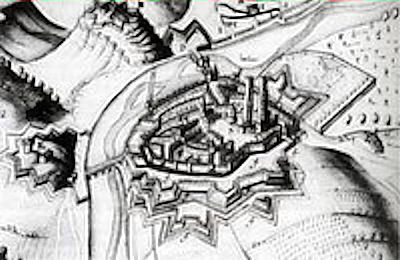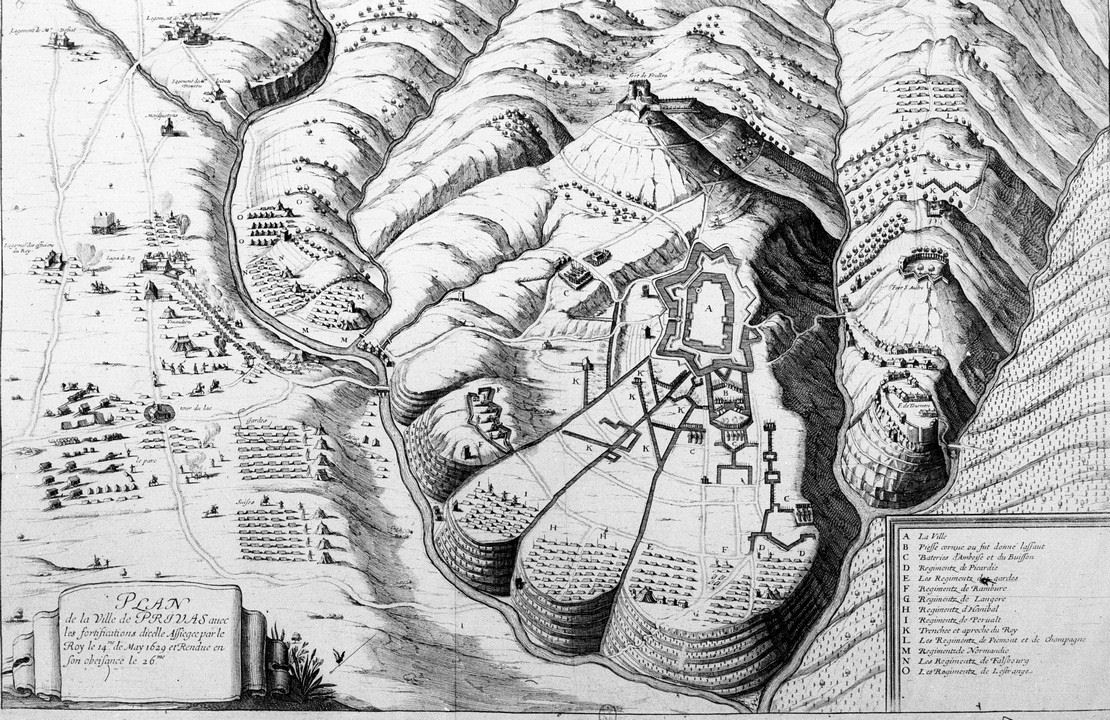|
Redition Of Montauban
The Surrender of Montauban occurred on 21 August 1629, when the Huguenot city of Montauban surrendered to the Catholic troops of the French king Louis XIII under the direction of Richelieu. In 1622, Mautauban had successfully resisted the assaults of Louis XIII, but the city finally lost its independence with its surrender to royal forces in 1629. Montauban was considered to be the most powerful Huguenot fortress in France after La Rochelle. The redition was the final chapter of the Huguenot rebellions, as the remnants of Huguenot power in southern France surrendered to the king. After the sieges of Privas and Alès, the remaining Huguenot cities rapidly fell, and finally Montauban surrendered without resistance. This was one of the last events in the repression of the Huguenot rebellions in France. The redition was followed by the Peace of Alès of 27 September 1629, which settled the revolt by guaranteeing the practice of the Huguenot religion and judicial protection, but req ... [...More Info...] [...Related Items...] OR: [Wikipedia] [Google] [Baidu] |
Siege Of Alès
The siege of Alès was undertaken by Louis XIII of France, and the city captured on 17 June 1629. The siege The siege of Alès followed the disastrous capitulation of the main Protestant stronghold of La Rochelle, in the siege of La Rochelle. Huguenot resistance persisted in the south of France though, and Louis XIII endeavoured to eliminate it as well. With Privas and Anduze, the city of Alès was at the center of a string of Protestants strongholds in the Languedoc, stretching from Nîmes and Uzès in the east, to Castres and Montauban in the west. Alès was selected by Antoine Hercule de Budos, Marquis des Portes (1589-1629), as a strategic target to sever Huguenot defenses in two and disconnect their main centers of Nîmes and Montauban. After Privas fell on 28 May 1629, in which the Marquis des Portes was killed, French attention turned to Alès. After an intense siege, the city surrendered on 17 June. At the end of the siege, Henri, Duke of Rohan, the leader of th ... [...More Info...] [...Related Items...] OR: [Wikipedia] [Google] [Baidu] |
Conflicts In 1629
Conflict may refer to: Arts, entertainment, and media Films * ''Conflict'' (1921 film), an American silent film directed by Stuart Paton * ''Conflict'' (1936 film), an American boxing film starring John Wayne * ''Conflict'' (1937 film), a Swedish drama film directed by Per-Axel Branner * ''Conflict'' (1938 film), a French drama film directed by Léonide Moguy * ''Conflict'' (1945 film), an American suspense film starring Humphrey Bogart * ''Catholics: A Fable'' (1973 film), or ''The Conflict'', a film starring Martin Sheen * ''Judith'' (1966 film) or ''Conflict'', a film starring Sophia Loren * ''Samar'' (1999 film) or ''Conflict'', a 1999 Indian film by Shyam Benegal Games * ''Conflict'' (series), a 2002–2008 series of war games for the PS2, Xbox, and PC * ''Conflict'' (video game), a 1989 Nintendo Entertainment System war game * '' Conflict: Middle East Political Simulator'', a 1990 strategy computer game Literature and periodicals * ''Conflict'' (novel) ... [...More Info...] [...Related Items...] OR: [Wikipedia] [Google] [Baidu] |
1629 In France
Events from the year 1629 in France. Incumbents *Monarch: Louis XIII Events * * * * * * * * May 14–May 28 – Huguenot rebellions: After a Siege of Privas, 15-day siege, Louis XIII captures Privas. * June 17 – Huguenot rebellions: Alès surrenders after Siege of Alès, an intense siege. As a result, the leader of the Huguenot Rebellions, the Henri, Duke of Rohan, Duke of Rohan, surrenders. * June 28 – Huguenot rebellions: Louis XIII, King of France, signs in his camp at Lédignan the Peace of Alès, ending the Huguenot rebellions. The Huguenots are allowed religious freedom, but lose their political, territorial and military rights. * August 21 – Huguenot rebellions: Montauban, one of the last Huguenot strongholds, Redition of Montauban, surrenders without a fight to Cardinal Richelieu, Richelieu's troops. Births * * * * * * * * April 1 – Jean-Henri d'Anglebert, French harpsichordist and composer (d. 1691) Deaths * October 2 – Pier ... [...More Info...] [...Related Items...] OR: [Wikipedia] [Google] [Baidu] |
Dragonnades
The ''Dragonnades'' were a French government policy instituted by King Louis XIV in 1681 to intimidate Huguenot (Protestant) families into converting to Catholicism. This involved the billeting of ill-disciplined dragoons in Protestant households with implied permission to abuse the inhabitants and destroy or steal their possessions. The soldiers employed in this role were satirized as "missionary dragoons". Background With the Edict of Nantes in 1598, Henry IV had ended France's Wars of Religion by granting a relatively high degree of toleration to the Huguenots, as well as political and military privileges. The latter were abolished in 1629 under the Peace of Alès following the Huguenot rebellions, but the provisions of the Edict granting religious tolerance were largely maintained under the governments of the Cardinals Richelieu and Mazarin. Louis XIV, however, aimed to have religious uniformity in his kingdom. Initially he offered the Huguenots financial incentives to con ... [...More Info...] [...Related Items...] OR: [Wikipedia] [Google] [Baidu] |
Peace Of Alès
The Peace of Alais, also known as the Edict of Alès or the Edict of Grace, was a treaty negotiated by Cardinal Richelieu Armand Jean du Plessis, Duke of Richelieu (; 9 September 1585 – 4 December 1642), known as Cardinal Richelieu, was a French clergyman and statesman. He was also known as ''l'Éminence rouge'', or "the Red Eminence", a term derived from the ... with Huguenot leaders and signed by King Louis XIII of France on 28 June 1629. It confirmed the basic principles of the Edict of Nantes but differed in that it contained additional clauses that stated that the Huguenots no longer had political rights and further demanded for them to relinquish all cities and fortresses immediately. It ended the religious warring and granting the Huguenots amnesty and guaranteed them tolerance. It did not last permanently, and Louis XIV resumed persecution of Protestants, culminating in the Revocation of the Edict of Nantes in 1685. External linksNew Catholic Dictionary< ... [...More Info...] [...Related Items...] OR: [Wikipedia] [Google] [Baidu] |
France
France (), officially the French Republic ( ), is a country primarily located in Western Europe. It also comprises of Overseas France, overseas regions and territories in the Americas and the Atlantic Ocean, Atlantic, Pacific Ocean, Pacific and Indian Oceans. Its Metropolitan France, metropolitan area extends from the Rhine to the Atlantic Ocean and from the Mediterranean Sea to the English Channel and the North Sea; overseas territories include French Guiana in South America, Saint Pierre and Miquelon in the North Atlantic, the French West Indies, and many islands in Oceania and the Indian Ocean. Due to its several coastal territories, France has the largest exclusive economic zone in the world. France borders Belgium, Luxembourg, Germany, Switzerland, Monaco, Italy, Andorra, and Spain in continental Europe, as well as the Kingdom of the Netherlands, Netherlands, Suriname, and Brazil in the Americas via its overseas territories in French Guiana and Saint Martin (island), ... [...More Info...] [...Related Items...] OR: [Wikipedia] [Google] [Baidu] |
Siege Of Privas
The siege of Privas was undertaken by Louis XIII of France from 14 May 1629, and the city of Privas was captured on 28 May 1629. It was one of the last events of the Huguenot rebellions (1621-1629). Context The siege of Privas followed the disastrous capitulation of the main Protestant stronghold of La Rochelle. Louis XIII then moved to eliminate the remaining Huguenot resistance in the south of France. With Alès and Anduze, the city of Privas was at the center of a string of Protestant strongholds in the Languedoc, stretching from Nîmes and Uzès in the east, to Castres and Montauban in the west. Privas was selected by Antoine Hercule de Budos, Marquis des Portes (1589-1629), as a strategic target; capturing it would break a line of Huguenot defences and disconnect their main centers of Nîmes and Montauban. The city was defended by Alexandre du Puy-Montbrun, a leading Protestant from Montbrun-les-Bains in the Dauphiné, already active in Montauban (1621). The siege Privas ... [...More Info...] [...Related Items...] OR: [Wikipedia] [Google] [Baidu] |
Huguenot
The Huguenots ( , also , ) were a religious group of French Protestants who held to the Reformed, or Calvinist, tradition of Protestantism. The term, which may be derived from the name of a Swiss political leader, the Genevan burgomaster Bezanson Hugues (1491–1532?), was in common use by the mid-16th century. ''Huguenot'' was frequently used in reference to those of the Reformed Church of France from the time of the Protestant Reformation. By contrast, the Protestant populations of eastern France, in Alsace, Moselle, and Montbéliard, were mainly Lutherans. In his ''Encyclopedia of Protestantism'', Hans Hillerbrand wrote that on the eve of the St. Bartholomew's Day massacre in 1572, the Huguenot community made up as much as 10% of the French population. By 1600, it had declined to 7–8%, and was reduced further late in the century after the return of persecution under Louis XIV, who instituted the '' dragonnades'' to forcibly convert Protestants, and then finally revoke ... [...More Info...] [...Related Items...] OR: [Wikipedia] [Google] [Baidu] |
Huguenot Rebellions
The Huguenot rebellions, sometimes called the Rohan Wars after the Huguenot leader Henri de Rohan, were a series of rebellions of the 1620s in which French Calvinist Protestants (Huguenots), mainly located in southwestern France, revolted against royal authority. The uprising occurred a decade after the death of Henry IV who, himself originally a Huguenot before converting to Catholicism, had protected Protestants through the Edict of Nantes. His successor Louis XIII, under the regency of his Italian Catholic mother Marie de' Medici, became more intolerant of Protestantism. The Huguenots tried to respond by defending themselves, establishing independent political and military structures, establishing diplomatic contacts with foreign powers, and openly revolting against central power. The Huguenot rebellions came after two decades of internal peace under Henry IV, following the intermittent French Wars of Religion of 1562–1598. First Huguenot rebellion (1620–1622) The fi ... [...More Info...] [...Related Items...] OR: [Wikipedia] [Google] [Baidu] |
La Rochelle
La Rochelle (, , ; Poitevin-Saintongeais: ''La Rochéle''; oc, La Rochèla ) is a city on the west coast of France and a seaport on the Bay of Biscay, a part of the Atlantic Ocean. It is the capital of the Charente-Maritime department. With 75,735 inhabitants in 2017, La Rochelle is the most populated commune in the department and ranks fifth in the New Aquitaine region after Bordeaux, the regional capital, Limoges, Poitiers and Pau. Its inhabitants are called "les Rochelaises" and "les Rochelais". Situated on the edge of the Atlantic Ocean the city is connected to the Île de Ré by a bridge completed on 19 May 1988. Since the Middle-Ages the harbour has opened onto a protected strait, the Pertuis d'Antioche and is regarded as a "Door océane" or gateway to the ocean because of the presence of its three ports (fishing, trade and yachting). The city has a strong commercial tradition, having an active port from very early on in its history. La Rochelle underwent sustained ... [...More Info...] [...Related Items...] OR: [Wikipedia] [Google] [Baidu] |



